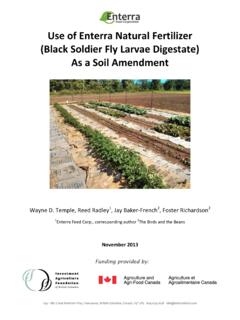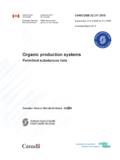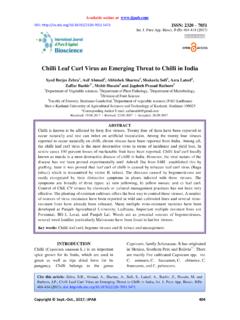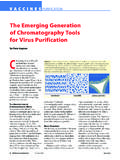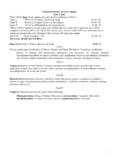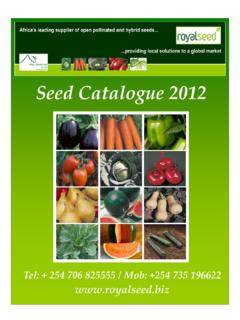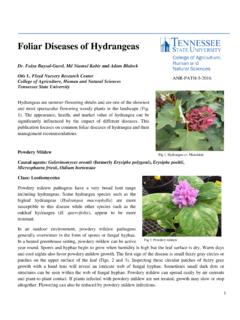Transcription of Controlling aphid-vectored viruses for organic seed potato ...
1 Controlling aphid-vectored viruses for organic seed potato production: Literature and knowledge review March 2011 Final report to: Fraserland Organics organic Sector Development Program By Marjolaine Dessureault Ren e Prasad Heather Meberg Carolyn Teasdale Cropconsult Ltd. Executive Summary While production of certified organic seed potatoes is a flourishing industry in BC (Anonymous, 2003), it has not grown fast enough to support the increasing demand for organic potatoes. One of the main limitations in the production of organic seed potatoes is the lack of control tools for viruses and their aphid vectors. potato virus Y (PVY) is one of the most important viruses as it can reduce yield.
2 Soap is the only aphicide currently registered for organic production and it provides insufficient control of aphids to meet seed potato standards. For the purpose of identifying additional management tools for non-persistent viruses and their aphid vectors, this literature review and knowledge review were conducted. Researchers have found ways to prevent the transmission of non-persistent viruses like PVY through the use of mineral oils as foliar sprays and trap crop borders planted around edges of potato fields. Paraffinic mineral oils sprayed weekly on potato plants act directly on aphid populations through insecticidal activity and by interfering with an aphid s ability to transmit non-persistent viruses .
3 Crop borders, such as soybean, wheat or potato , planted around edges of potato fields act as virus sinks . The crop border method is based on two facts 1) aphids, attracted to contrast between green (crop) and dark (soil), usually land on field margins and start feeding 2) aphids that arrive carrying a non-persistent virus on their mouthparts will land on the crop border, start feeding, and lose their capacity to transmit non-persistent virus to the main crop. While mineral oil and crop border plantings have been widely used to control non-persistent potato viruses in organic seed potato production Europe, their use in North America is limited. Some growers in the US have been using these tools with success, and BC seed potato growers could benefit from integrating these tools into their production practices.
4 Introduction and Objectives Potatoes are an important vegetable crop for many organic farms in British Columbia. However, potatoes are susceptible to a wide range of diseases which makes organic production a challenge. The use of certified seed potatoes is an important practice for the management of potato diseases, especially those caused by viruses , as viruses have the potential to reduce potato yields. potato virus Y (PVY) is one of the most important viruses . For each 1% increase in PVY incidence yield can be reduced by t/ha in commonly grown varieties such as Russet Norkotak, Russet Burbank and Shepody (Whitworth et al. 2006). PVY like most potato viruses are vectored by aphids, thus virus diseases can spread rapidly to neighbouring fields if aphid vectors are not controlled.
5 Production therefore of seed potatoes, certified to have very low ( below economic impact) virus levels, requires management of both the virus and the aphid vector. Production of certified organic seed potatoes is a growing industry in BC (Anonymous, 2003). However, production of certified organic seed potatoes has not kept pace with consumer demand for organic potatoes. Because there is an insufficient supply of organic seed potatoes, organic growers are allowed to use conventionally-produced seed tubers. However, certification bodies are increasingly demanding the use of organic propagation material, and seed potato growers would like to supply this market. One of the main limitations for the production of organic seed potatoes is the lack of organic management tools for viruses and their aphid vectors.
6 Although many insects can vector viruses , aphids are the most important vectors for potatoes. The green peach aphid, Myzus persicae, is the most common aphid species in potatoes and the most efficient at transmitting potato viruses (Radcliffe and Ragsdale 2002). Other aphid species such as the potato aphid, Macrosiphum euphorbiae, buckthorn aphid, Aulacorthum solani, and melon aphid, Aphis gossypii are also of concern (Radcliffe and Ragsdale 2002). viruses can be divided into two groups - persistent and non-persistent viruses . Distinguishing the virus transmission process between persistent and non-persistent viruses is crucial in order to evaluate potential vector controls. When an aphid feeds on a plant infected by a persistent virus ( potato leaf roll virus ), it can take hours of probing and incubation before the aphid acquires the virus and has the potential to transmit to another plant.
7 For these viruses , contact insecticides are a good tool to prevent aphids from infecting healthy plants (Radcliffe and Ragsdale 2002). However, in the case of a non-persistent virus ( PVY), an aphid probing an infected plant will instantly acquire the virus ; the virus will then remain in the aphid s mouthpart (stylet) until it probes another plant (Fereres and Moreno 2009). Consequently, aphids carrying non-persistent viruses have the potential to infect other plants very quickly. For non-persistent viruses , most insecticides do not prevent virus transmission (Perring et al. 1999) because they do not act fast enough to prevent aphids from inserting their mouthparts ( probing) into plants (Loebenstein and Raccah 1980).
8 Control tools that would prevent inoculation and acquisition of virus by aphids are necessary to control non-persistent viruses . Soap is the only aphicide currently registered for organic production and it provides insufficient control of aphids to meet seed potato standards. Like other insecticides (conventional or organic ), soap does not reduce the transmission of non-persistent mosaic viruses (the most common being PVY) since it does not prevent aphids from probing. Researchers have found other ways to prevent the transmission of non-persistent viruses like PVY and these methods include the use of mineral oils as foliar sprays and trap crop borders planted around edges of potato fields.
9 Both of these approaches would be suitable for the production of organic seed potatoes. The objectives of this study are: 1. Review the recent literature with regards to non-persistent virus control using mineral oil and crop border management tools. 2. Interview growers and agricultural experts from the Fraser Valley and other growing regions to determine how extensively these two management approaches are being used. 3. Determine the feasibility of these strategies for use in the Fraser Valley. Objective 1. Literature Review: Mineral Oil Mineral oil was first examined for preventing virus transmission by Bradley et al. (1962). In their lab experiments, they showed that mineral type oils have the potential to completely inhibit transmission of PVY by aphids to healthy tobacco plants if the plants are coated with the oils.
10 Following the findings of Bradley et al. (1962), mineral oil has been used extensively by growers in Europe. Although there are several types of mineral oils, Wijs (1980) demonstrated that the optimum virus transmission inhibition was obtained by paraffinic mineral oil. Since then, research has mostly focused on paraffinic mineral oils, derived from the petroleum industry ( Sunoco 7E, Sunspray Ultrafine 85%, Sunspray 850 EC, etc). Glacial Spray Fluid (Loveland Products Inc), organic JMS Stylet Oil (JMS Flower Farms Inc) and Purespray/13E (Petro Canada) are paraffinic mineral oils that are currently approved for organic production in the US. There are a number of mineral oils currently registered in Canada, including Purespray/13E (see Appendix I), however none of these products have potato on the current Canadian label.
